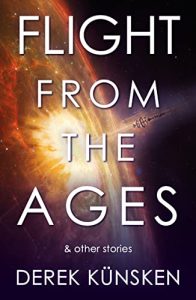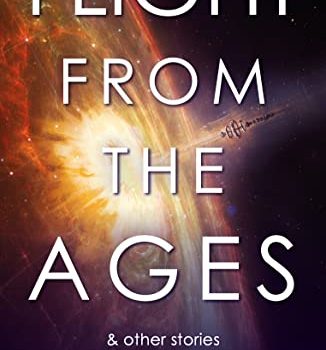Wole Talabi Reviews Flight from the Ages and Other Stories by Derek Künsken
 Flight from the Ages and Other Stories, Derek Künsken (Solaris 978-1-78618-728-4, $16.99, 400pp, tp) December 2022.
Flight from the Ages and Other Stories, Derek Künsken (Solaris 978-1-78618-728-4, $16.99, 400pp, tp) December 2022.
Have you ever looked up at the night sky, seen the stars and felt the knowledge that you are looking into the past overwhelm you? It can be a dizzying feeling, like being tipsy or high, and it is what I felt after reading most of the stories in Canadian author Derek Künsken’s first collection, Flight From the Ages and Other Stories. All of which also seems to be the objective of much of Künsken’s work.
In the preface, he says: ‘‘I’m a sense of wonder junkie. I always have been.’’ I’m one too, and if you recognize that feeling then you are liable to thoroughly enjoy this collection. While they have all previously appeared in other venues (most in Asimov’s), putting them together really allows their themes to shine.
Künsken’s work largely explores the relationship between time, technology, and personhood using the best tools of hard SF. There are interesting and sometimes profound connections to these themes in each story. The writing style in every story is consistent, if unvarying, but it is also confident, clear, and sometimes deeply moving.
‘‘And Ulixes and Poluphemos rose in their ship, looking back with longing to the corpse of a star that had sheltered them in accelerated time for so long.’’ In the engaging and effective opening short story, ‘‘Beneath Sunlit Shallows’’, a group of humans have arrived on a hostile world that constantly threatens their existence and have genetically engineered themselves to survive deep in its oceans, each generation different from the previous, leading Vincent, the protagonist, to question the ethics and morality of survival.
‘‘Schools of Clay’’, a story of class warfare and revolution told from the POV of an inorganic boron-silicate hive creature in a colony that lives on asteroids orbiting a pulsar black hole, is riveting. The creatures gather resources and migrate in cycles, using the time-altering physics of black hole to flee predators known as shaghāl. Künsken explores the exploitative class system in place and highlights the tension between the desires of the self and the collective. The geology, physics and chemistry of this novelette are unique, detailed, and very alien, yet still recognizable. It’s not an easy read, but it is a very rewarding one.
In the novelette ‘‘Persephone Descending’’, Marie-Claude’s routine maintenance job on Venus goes wrong when her craft is sabotaged and she is ejected into the harsh atmosphere, pursued by a killer drone with a survival clock ticking. She learns during her descent into this alien hell of Venus’s ‘‘blinding sulfuric acid, biting cold, ferocious winds… crushing pressure and melting heat,’’ to use her technology and the extreme natural biology of the planet to survive long enough to be rescued. The story is layered with the politics of Venus, her own identity as a child of Haitian refugees to Quebec, and concerns of self-determination. Interesting.
The novella ‘‘Pollen from a Future Harvest’’ wobbles, but has undeniably compelling ideas and homes in on the theme of time. Major Chenesai Okonkwo of the Sub-Saharan Union tries uncover what happened in the suspicious death of her husband. The expeditionary force they are part of has mutinied and is conducting research on a secret portal they have found that links 11 years into the past and the future, hoping to use it to gain agency and independence. While the vegetable intelligences, tripartite arranged marriages, intricate spy-vs-spy and detective elements of the story are great, some of the ‘‘African’’ names here threw me off, and there is some uncharacteristically clunky setup. Still, I enjoyed it, and the story is very aware of the fraught nature of geopolitics predicated on colonization.
We create right and wrong, Tin. The Congregate makes imbalanced alliances and punishes disobedience. We break oaths. The Congregate plants commissars among its clients. We spin counter-intelligence webs to sweep them out. We all make past and future and truth with unclean hands.
The titular novelette ‘‘Flight from the Ages’’, is spectacular. It follows a banking AI, Ulixes, asked to investigate something odd in a distant star system. What it finds triggers a rapidly expanding singularity. It flees and the story takes ever larger leaps into the future, with increasing stakes and consequences and new intelligences appearing, until eventually, we end up back at the beginning of the universe itself. I loved this wonderfully entertaining and abstract escape from the end of the universe.
‘‘Tool Use by the Humans of Danzhai County’’ brings us from alien worlds back to Earth to close, and takes place over a 100-year time span in China. It follows Qiao Fue and the daughter he refused to acknowledge, Lian Mee, as they separately use AI and biotech technologies to change the world around them: Qiao Fue, to achieve his selfish economic goals; Lian Mee, to improve society. It’s a beautifully written story, told from multiple intersecting points of view. The final scene almost brought me to tears, reminding me of the point of all that sense of wonder. It is to move us.
Philosophical, clever, and emotional while featuring a diverse range of characters and intelligences, Künsken’s collection does just that.
Wole Talabi is an engineer, writer, and editor from Nigeria. He’s hopped around the planet quite a bit but right now, he lives in Malaysia. His stories have appeared in Asimov’s, Lightspeed, F&SF, Clarkesworld and several other places. He has edited three anthologies and been a finalist for several awards including the Caine Prize, the Locus Award, and the Nommo Award. His work has also been translated into Spanish, Norwegian, Chinese, Italian, Bengali, and French. His collection Incomplete Solutions (2019), is published by Luna Press and his debut Novel Shigidi, will be published by DAW books in fall, 2023.
This review and more like it in the January 2023 issue of Locus.
 While you are here, please take a moment to support Locus with a one-time or recurring donation. We rely on reader donations to keep the magazine and site going, and would like to keep the site paywall free, but WE NEED YOUR FINANCIAL SUPPORT to continue quality coverage of the science fiction and fantasy field.
While you are here, please take a moment to support Locus with a one-time or recurring donation. We rely on reader donations to keep the magazine and site going, and would like to keep the site paywall free, but WE NEED YOUR FINANCIAL SUPPORT to continue quality coverage of the science fiction and fantasy field.
©Locus Magazine. Copyrighted material may not be republished without permission of LSFF.








